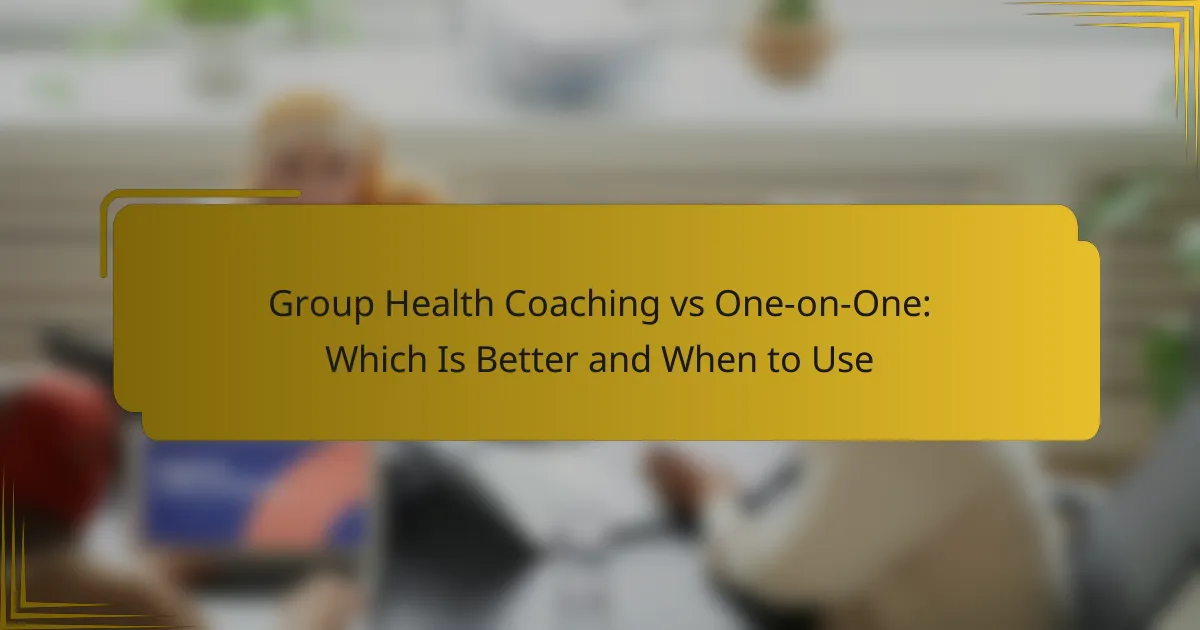Choosing between group health coaching and one-on-one coaching depends on individual needs and preferences. Group coaching promotes a supportive community and shared motivation, making it ideal for those who thrive in collaborative settings. In contrast, one-on-one coaching offers personalized attention and customized strategies, perfect for individuals seeking focused guidance on their unique health challenges.

What are the benefits of Group Health Coaching?
Group health coaching offers several advantages, including enhanced support networks, cost savings, and increased motivation among participants. It fosters a collaborative environment where individuals can learn from each other while working towards common health goals.
Enhanced community support
Group health coaching creates a sense of community among participants, which can significantly enhance emotional support. Individuals often feel more comfortable sharing their challenges and successes in a group setting, leading to stronger bonds and encouragement.
This support can be particularly beneficial for those facing similar health issues, as shared experiences can foster understanding and empathy. Participants may find that they are more likely to stick with their health plans when they have a community cheering them on.
Cost-effective for organizations
Implementing group health coaching can be more cost-effective for organizations compared to one-on-one coaching. Group sessions typically require fewer resources, allowing organizations to provide support to more employees at a lower cost per person.
This approach can lead to improved overall employee health and reduced healthcare costs in the long run, making it an attractive option for companies looking to enhance their wellness programs.
Increased motivation through group dynamics
Group dynamics play a crucial role in boosting motivation among participants. The collective energy and enthusiasm in a group can inspire individuals to push themselves further than they might in a solo setting.
Participants often find that sharing their goals and progress with others creates a sense of accountability, which can lead to higher levels of commitment and achievement.
Access to diverse perspectives
Group health coaching allows participants to benefit from a variety of perspectives and experiences. This diversity can enrich discussions and provide insights that individuals may not have considered on their own.
Hearing different approaches to similar challenges can inspire new strategies and solutions, making the coaching experience more comprehensive and effective.
Structured learning environment
A structured learning environment is a hallmark of group health coaching, providing participants with a clear framework to follow. This structure often includes set topics, activities, and goals for each session, which can help keep participants engaged and focused.
Such an environment not only facilitates learning but also encourages consistency, as participants can track their progress over time and build on their knowledge in a systematic way.

When should you choose One-on-One Health Coaching?
One-on-one health coaching is ideal when you need personalized guidance and a focused approach to your health goals. This method allows for tailored strategies that address your unique challenges and aspirations.
Personalized attention and tailored plans
One-on-one health coaching provides individualized attention that group settings cannot match. Coaches can assess your specific needs, preferences, and lifestyle, creating a customized plan that aligns with your goals.
This tailored approach often leads to more effective outcomes, as the coach can adjust strategies based on your progress and feedback. For example, if you’re struggling with a particular diet, the coach can modify your meal plan to better suit your tastes and habits.
Confidentiality for sensitive issues
In a one-on-one setting, you can discuss sensitive health issues without fear of judgment or exposure. This confidentiality encourages open communication, which is crucial for addressing personal challenges such as mental health, weight management, or chronic conditions.
Knowing that your discussions are private can help you feel more comfortable sharing your concerns, leading to more effective coaching and support.
Flexible scheduling options
One-on-one coaching often offers more flexible scheduling compared to group sessions. You can arrange appointments that fit your personal timetable, whether that means early mornings, evenings, or weekends.
This flexibility makes it easier to maintain consistency in your coaching sessions, which is vital for achieving long-term health goals.
Specific goal focus
With one-on-one coaching, you can concentrate on specific goals that matter most to you. Whether it’s weight loss, improving fitness levels, or managing stress, the coach can help you develop a focused action plan.
This targeted approach allows for deeper exploration of your goals, ensuring that every session is relevant and productive. For instance, if your primary aim is to lower cholesterol, the coach can provide specialized dietary advice and exercise recommendations.
Direct accountability with a coach
Having a dedicated coach means you have someone to hold you accountable for your progress. This accountability can motivate you to stick to your plans and make healthier choices.
Regular check-ins with your coach can help you stay on track, as they can provide encouragement and adjust your strategies as needed. For example, if you miss a workout, your coach can help you identify barriers and find solutions to overcome them.

How do Group and One-on-One Coaching compare?
Group coaching and one-on-one coaching each offer unique benefits and drawbacks. Group coaching fosters community and shared experiences, while one-on-one coaching provides personalized attention and tailored strategies.
Cost differences
Group coaching is generally more affordable than one-on-one coaching. Participants can expect to pay a fraction of the cost, often ranging from 20% to 50% less per session compared to individual coaching rates.
However, the overall value may vary based on the coach’s expertise and the specific program. Some high-end group coaching programs may charge premium prices, so it’s essential to compare offerings carefully.
Engagement levels
Engagement levels can differ significantly between group and one-on-one coaching. Group coaching often encourages interaction among participants, fostering a sense of accountability and motivation through shared goals.
In contrast, one-on-one coaching allows for deeper personal engagement, as clients can focus solely on their individual challenges and receive direct feedback from the coach.
Effectiveness for different goals
The effectiveness of group versus one-on-one coaching largely depends on the client’s goals. Group coaching is beneficial for those seeking support in a community setting or looking to develop social skills.
One-on-one coaching is typically more effective for individuals with specific, personal objectives, such as overcoming particular obstacles or achieving targeted outcomes.
Preferred learning styles
Individuals have varying learning styles that can influence their preference for group or one-on-one coaching. Those who thrive in collaborative environments may find group coaching more engaging and beneficial.
Conversely, individuals who prefer personalized instruction and tailored feedback might excel in one-on-one settings, where they can receive focused guidance and adapt their learning pace.
Availability of resources
Group coaching often provides access to a wider range of resources, such as shared materials, group discussions, and diverse perspectives from fellow participants. This can enhance the learning experience and provide multiple viewpoints on common challenges.
On the other hand, one-on-one coaching typically offers customized resources that are specifically designed for the individual’s needs, which can lead to more targeted skill development and problem-solving strategies.

What criteria should you consider when choosing between them?
When deciding between group health coaching and one-on-one coaching, consider individual goals, personal preferences, and the desired level of interaction. Each approach has unique benefits that may align differently with your specific health objectives and lifestyle.
Individual goals and preferences
Your personal health goals significantly influence whether group or one-on-one coaching is more suitable. For instance, if you aim to lose weight or improve fitness in a supportive environment, group coaching can provide motivation and accountability. Conversely, if you have specific medical conditions or require tailored strategies, individual coaching may be more effective.
Consider your comfort level with sharing personal information. If you prefer privacy and personalized attention, one-on-one sessions allow for deeper discussions and customized plans. Group settings can foster camaraderie but may not suit everyone’s needs.
Evaluate your learning style as well. Some individuals thrive in collaborative environments, benefiting from shared experiences and diverse perspectives in group coaching. Others may find they learn better through focused, individualized attention, which is a hallmark of one-on-one coaching.
